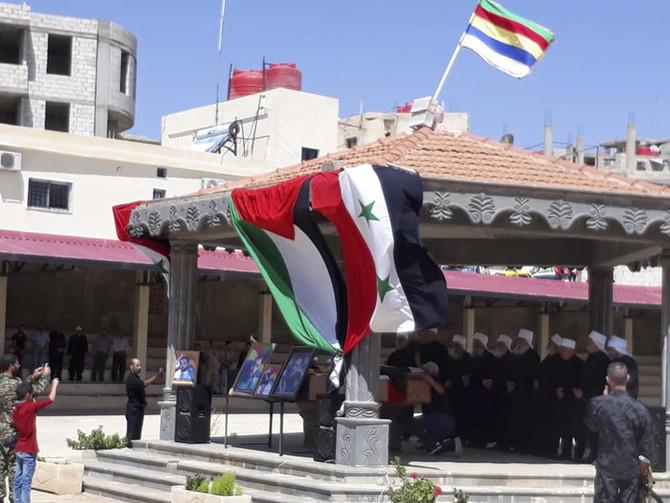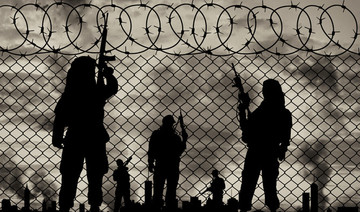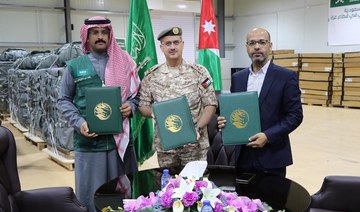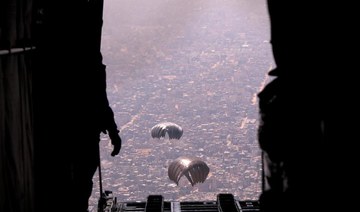BEIRUT: Syria’s Druze minority, targeted by deadly Daesh group attacks and kidnappings last week in Sweida, had managed to keep itself relatively insulated from the country’s seven-year war.
Here is a summary of the community’s profile, its role in Syria’s conflict and previous attacks against it.
With around 700,000 people, the Druze community accounted for around three percent of Syria’s pre-war population of 23 million.
They are located mainly in the southern province of Sweida with smaller pockets around Damascus and in the northwest, although some have fled extremist held parts of the latter area.
Druze are monotheistic and considered Muslim, but the sect is otherwise highly secretive, includes mystical elements like reincarnation, and does not allow new converts.
Some 200,000 Druze are located in neighboring Lebanon and over 100,000 are in Israel, while 18,000 live in the Israeli-occupied Golan.
Syria’s Druze have been split by the uprising that erupted in 2011 against President Bashar Assad, who had long portrayed himself as a protector of the country’s minorities.
Druze should not be seen “as being neutral in this war — it’s more multifaceted and the Druze are not a monolithic bloc,” said Tobias Lang, an analyst focused on Druze populations in the Middle East.
One of the first soldiers to defect from Syria’s army in protest at its handling of demonstrations was Druze officer Khaldun Zeineddine, who later died in clashes against regime forces.
Others remained firmly loyal, like General Issam Zahreddine, one of the highest-ranking Druze army officers who died last year in a mine blast after battling the Daesh group in Syria’s east.
Druze leaders have often tried to maintain a precarious relationship with the regime to keep their areas autonomous and spare them from government attacks.
One symbol of that complex relationship was Wahid Al-Balous, a Druze religious authority who pushed for the sect’s soldiers to be deployed near their hometowns, rather than in other provinces.
Balous, who died in a car bomb attack in Sweida in 2015, spoke out against both extremists and Assad.
Syria’s Druze have protected their heartland in Sweida with their own forces.
The most powerful has been the Sheikhs of Dignity, which was headed by Balous and included fighters and other religious figures.
Sheikhs of Dignity has fought fierce battles against the Daesh group and Al-Qaeda’s Syrian affiliate.
Other militia have been closely linked to the regime, including the Dareh Al-Watan (Shield of the Nation), a Druze force founded in April 2015 with 2,000 fighters.
The militia appear to have protected Sweida’s sons from compulsory military service, with authorities turning a blind eye so long as young men fight in units not opposed to the regime.
Suicide bombs and shootings carried out by Daesh in Sweida on Wednesday left more than 250 people dead, mostly civilians, and the extremists reportedly kidnapped more than 30 Druze women and children.
The attacks were by far the worst against the Druze community in seven years of war, but they were not the first.
A car bomb in 2012 ripped through Damascus’ Jaramana suburb, which is mostly Druze and Christian.
In 2013 and 2014, fierce fighting between Syrian rebels and pro-regime Druze forces rocked Sweida province and Druze areas closer to Damascus.
Daesh began attacking Sweida province in 2015, first targeting Khalkhalah military airport.
That same year, 20 Druze Syrians were killed in a shoot-out with Al-Qaeda extremists in the village of Qalb Lawzah in northwestern Idlib province.
Druze residents of Qalb Lawzah had come out against the regime a year into Syria’s uprising.
In 2016, Daesh beheaded four laborers in an area it controlled outside Damascus, accusing them of being Druze.
And in 2017, a car bomb killed nine people in Hader, a regime-held village in the southwestern province of Quneitra mostly populated by Druze.
Syria’s Druze minority walk a war-time tightrope
Syria’s Druze minority walk a war-time tightrope

- The Druze in Syria had managed to keep themselves relatively insulated from the country’s seven-year war
- Suicide bombs and shootings carried out by Daesh in Sweida on Wednesday left more than 250 people dead
Israel warns of escalation from cross-border fire from Hezbollah

- Hezbollah says it will not halt fire unless Israel stops its military offensive on Gaza
JERUSALEM: Intensified cross-border fire from Lebanon’s Hezbollah movement into Israel could trigger serious escalation, the Israeli military said on Sunday.
“Hezbollah’s increasing aggression is bringing us to the brink of what could be a wider escalation, one that could have devastating consequences for Lebanon and the entire region,” Israeli military spokesperson Rear Admiral Daniel Hagari said in a video statement in English.
Iran-backed Hezbollah last week launched the largest volleys of rockets and drones yet in the eight months it has been exchanging fire with the Israeli military, in parallel with the Gaza war.
After the relatively heavy exchanges over the past week, Sunday saw a marked drop in Hezbollah fire, while the Israeli military said that it had carried out several air strikes against the group in southern Lebanon.
The US and France are working on a negotiated settlement to the hostilities along Lebanon’s southern border. Hezbollah says it will not halt fire unless Israel stops its military offensive on Gaza.
“Israel will take the necessary measures to protect its civilians — until security along our border with Lebanon is restored,” Hagari said.
‘No joy’: Gazans mark somber Eid in shadow of war

- Many Palestinians forced to spend holiday without their loved ones
- I hope the world will put pressure to end the war on us because we are truly dying, and our children are broken
GAZA STRIP: In tents in the stifling heat and bombed-out mosques, Gazans on Sunday marked the start of the Eid Al-Adha holiday, devoid of the usual cheer as the Israel-Hamas war raged on.
“There is no joy. We have been robbed of it,” said Malakiya Salman, a 57-year-old displaced woman now living in a tent in Khan Younis City in the southern Gaza Strip.
Gazans, like Muslims the world over, would usually slaughter sheep for the holiday — whose Arabic name means “feast of the sacrifice” — and share the meat with the needy.
Parents would also give their children new clothes and money for the celebration.
But this year, after more than eight months of a devastating Israeli campaign that has flattened much of Gaza, displaced most of the besieged territory’s 2.4 million people, and sparked repeated warnings of famine, the Eid is a day of misery for many.
“I hope the world will put pressure to end the war on us because we are truly dying, and our children are broken,” said Salman.
Her family was displaced from the far-southern city of Rafah, a recent focus of the fighting which began after Hamas’s Oct. 7 attack on southern Israel.
The military on Sunday morning announced a “tactical pause of military activity” around a Rafah-area route to facilitate the delivery of desperately needed humanitarian aid to Gazans.
AFP correspondents said there were no reports of strikes or shelling since dawn, though the Israeli military stressed there was “no cessation of hostilities in the southern Gaza Strip.”
The brief respite in fighting allowed worshippers a rare moment of calm on holiday.
Many gathered for the Eid Al-Adha morning prayer in the courtyard of Gaza City’s historic Omari Mosque, which was heavily damaged in Israeli bombardment, placing down their frayed prayer mats next to mounds of rubble.
The sound of prayers traveled down some of the city’s destroyed and abandoned streets.
“Since this morning, we’ve felt a sudden calm with no gunfire or bombings ... It’s strange,” said 30-year-old Haitham Al-Ghura from Gaza City.
He hoped the pause meant a permanent ceasefire was near, though truce mediation efforts have stalled for months.
In several areas of the war-battered territory, especially in Gaza City, young boys were seen manning roadside shops selling perfumes, lotions, and other items against the backdrop of piles of rubble from destroyed buildings and homes.
Many vendors used umbrellas to protect themselves from the scorching sun as they sold household items on Gaza City’s main market street. But there were few buyers.
Food and other goods can reach four or five times their usual price, but those who cling to the holiday traditions can still afford them.
In Khan Younis, displaced man Majdi Abdul Raouf spent 4,500 shekels ($1,200) — a small fortune for most Gazans — on a sheep to sacrifice.
“I was determined to buy it despite the high prices, to perform these rituals and bring some joy and happiness to the children in the displacement camp,” said the 60-year-old, who fled his home in Rafah.
“There is sadness, severe pain, and suffering, but I insisted on having a different kind of day.”
The deadliest-ever Gaza war began after Hamas’s unprecedented Oct. 7 attack.
Israel’s retaliatory offensive has killed at least 37,337 people in Gaza, also mostly civilians, according to the Health Ministry in the territory.
For many, a halt in fighting can never bring back what has been lost.
“We’ve lost many people, there’s a lot of destruction,” said Umm Mohammed Al-Katri from Jabalia refugee camp in northern Gaza.
“This Eid is completely different,” she said, with many Gazans forced to spend the holiday without their loved ones killed or displaced during the war.
Grieving families on Sunday flocked to cemeteries and other makeshift burial sites, where wooden planks marked the graves.
“I feel comfort here,” said Khalil Diab Essbiah at the cemetery where his two children are buried.
Even with the constant buzzing of Israeli drones overhead, visitors at the cemetery “can feel relieved of the genocide we are in and the death and destruction,” he said.
Hanaa Abu Jazar, 11, also displaced from Rafah to the tent city in Khan Yunis, said: “We see the (Israeli) occupation killing children, women and the elderly.”
“How can we celebrate?” asked the girl.
Jordan conducts three airdrops in southern Gaza

- Aid packages containing food, clothing, and sweets were delivered to various locations in the southern Gaza
AMMAN: Jordan’s armed forces conducted three airdrops to the southern part of Gaza on Sunday, in collaboration with Egypt, to mark the first day of Eid Al-Adha, Jordan News Agency reported.
Aid packages containing food, clothing, and sweets were delivered to various locations in the southern Gaza Strip by two planes from the Royal Jordanian Air Force and an aircraft from Egypt.
Earlier on Saturday, a 45-truck humanitarian aid convoy arrived in Gaza, sent by the JAF and the Jordan Hashemite Charity Organization (JHCO).
In cooperation with its regional and international allies, the Jordanian armed forces have carried out 261 airdrops and delivered 1,970 trucks of aid since the beginning of Israel’s onslaught on Gaza.
WHO chief Tedros Adhanom Ghebreyesus said that “a significant proportion of Gaza’s population is now facing catastrophic hunger and famine-like conditions,” as Israel continues to impose severe restrictions on the supply of food, water, medicine, and fuel to the Strip.
Kuwait Red Crescent distributes meat to Lebanese families, Syrian, Palestinian refugees

- Initiative follows last week's distribution of Eid Al-Adha packages by the KRCS
LONDON: The Kuwait Red Crescent Society (KRCS) has launched an initiative to distribute meat to around 1,500 Lebanese families, as well as Syrian and Palestinian refugees in Lebanon, in celebration of Eid Al-Adha, Kuwait News Agency reported on Sunday.
Youssef Boutros, relief coordinator of the Lebanese Red Cross (LRC), announced that the distribution process had begun on Sunday.
This initiative follows last week's distribution of Eid Al-Adha packages by the KRCS, which included clothes and other essentials for around 2,000 families, covering Lebanese families and Syrian and Palestinian refugees.
In addition to these efforts, the KRCS is continuing its humanitarian aid to 6,000 Lebanese families in southern Lebanon, who have been affected by military confrontations between Hezbollah and Israel since October.
This aid, which includes food and staple supplies, is being distributed with the assistance of the LRC.
ICC members demand end to ‘intimidation’ so court can carry out work

- Group of 93 states issues statement amid reports of Israeli activities against court
- Call is also in response to the behavior of other countries
LONDON: A group of 93 states has demanded the International Criminal Court be allowed to work “without intimidation” after reports that Israel has been engaged in a nine-year clandestine campaign to undermine it.
In a statement the group said it would work to preserve the court’s “integrity from any political interference and pressure,” amid claims by the office of the ICC’s chief prosecutor, Karim Khan, that it has received threats after he requested arrest warrants for senior Israeli government and Hamas figures, including Israel’s prime minister, Benjamin Netanyahu, and Defense Minister Yoav Gallant.
The statement in defense of the ICC, which called on “all states to ensure full cooperation with the court for it to carry out its important mandate,” was drafted by Belgium, Chile, Jordan, Senegal and Slovenia after “eye-opening” revelations about Israeli intelligence operations against the court published in The Guardian. It was also signed by Western states including Germany, France, Canada and the UK.
A diplomatic source told the paper that the story had “made some (diplomats) realise that it’s time to put out some sort of statement from the states that belong to the court, responding to what has now come to light.”
The source added that the statement was not just aimed at the actions of Israeli intelligence agencies but was also a response to the behavior of other states, including a cyberattack on the ICC last year that came during investigations into senior Russian figures accused of involvement or complicity in crimes committed in Ukraine.
The source told The Guardian: “The court is going after some very powerful people, not just in the Palestine investigation, and it’s time to send a message that the state parties are there to defend it.”
Danya Chaikel, the International Federation for Human Rights’ representative to the ICC, said: “This is a unique moment of international solidarity, with 93 ICC states parties standing up for global justice and accountability for mass atrocities. They are collectively opposing the egregious threats to the court from powerful countries including Israel, the US and Russia, and strongly rejecting their efforts to manipulate the rule of law for political gains.”






















